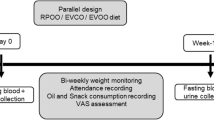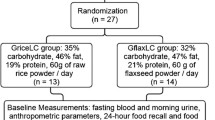Abstract
Background
A number of studies have shown that consumption of vegetable oils may improve diabetes complications including inflammatory response and oxidative stress, but no study has been done on the effects of canola oil (CO) and olive oil (OO) consumption in patients with type 2 diabetes. This clinical trial was done to compare the effects of CO and OO on insulin resistance, inflammation and oxidative stress in women with type 2 diabetes.
Methods
This randomized controlled clinical trial was done on 77 type 2 diabetic women. 4 weeks before the intervention, lipid-lowering drugs intakes were cut under the supervision of an endocrinologist. The participants were randomly divided into 2 intervention groups (Balanced diet +30 g/day CO or OO) and one control group (Balanced diet +30 g/day of sunflower oil (SFO)). Dietary intakes were assessed using three 24-h food records at baseline and at weeks 4 and 8 of the interventions. At baseline and after 8 weeks, height, weight, waist circumference, fasting blood sugar (FBS), serum insulin, C-reactive protein (CRP) and malondialdehyde (MDA) were measured.
Results
After the intervention in the inter-group analysis, CRP level was reduced significantly in CO and OO groups but no significant changes were observed in other factors. CRP reductions were also significant between all of the groups but not for other factors.
Conclusions
Replacing CO and OO with SFO as part of daily dietary fat in the diet of people with type 2 diabetes is recommended for reducing Inflammation and Oxidative Stress.
Trial registration.
This study is approved by the Ethics Committee of Shiraz University of Medical Sciences (IR.SUMS.REC.1394.27) and is recorded in the Iranian Registry of Clinical Trials (IRCT2015062722818N1).

Similar content being viewed by others
Abbreviations
- ALA:
-
Alpha-Linolenic Acid
- BMI:
-
Body Mass Index
- CO:
-
Canola Oil
- CRP:
-
C - reactive protein
- CVD:
-
Cardiovascular Diseases
- EER:
-
Estimated Energy Requirement
- FBS:
-
Fasting Blood Sugar
- LDL-C:
-
Low-density Lipoprotein Cholesterol
- MDA:
-
Malondialdehyde
- MUFA:
-
Monounsaturated Fatty Acid
- OO:
-
Olive Oil
- PUFA:
-
Polyunsaturated Fatty Acid
- ROS:
-
Reactive Oxygen Species
- SFA:
-
Saturated Fatty Acid
- SFO:
-
Sunflower Oil
- TG:
-
Triglycerides
References
Simsek S, Van Den Oever I a M, Raterman HG, Nurmohamed MT. Endothelial dysfunction, inflammation, and apoptosis in diabetes mellitus. Mediat Inflamm. 2010;2010:1–15. https://doi.org/10.1155/2010/792393.
Rahimi GRM, Attarzadeh Hosseini SR. The effect of aerobic training and diet on lipid profile and liver enzymes in obese women with type II diabetes. Daneshvar Med. 2014;21:1–11. https://profdoc.um.ac.ir/paper-abstract-1040555.html#tabs-1
Azizi-Soleiman F, Jazayeri S, Eghtesadi S, Rajab A, Heidari I, Vafa MR, et al. Effects of pure eicosapentaenoic and docosahexaenoic acids on oxidative stress, inflammation and body fat mass in patients with type 2 diabetes. Int J Prev Med. 2013;4:922–8. http://www.ncbi.nlm.nih.gov/pubmed/24049619. Accessed 13 Apr 2016
De Rekeneire N, Peila R, Ding J, Colbert LH, Visser M, Shorr RI, et al. Diabetes, hyperglycemia, and inflammation in older individuals: the health, aging and body composition study. Diabetes Care. 2006;29(8):1902–8. https://doi.org/10.2337/dc05-2327.
Smith A, Patterson C, Yarnell J, Rumley A, Ben-Shlomo Y, Lowe G. Which hemostatic markers add to the predictive value of conventional risk factors for coronary heart disease and ischemic stroke? The Caerphilly study. Circulation. 2005;112:3080–7. https://doi.org/10.1161/CIRCULATIONAHA.105.557132.
Hoy AJ, Brandon AE, Turner N, Watt MJ, Bruce CR, Cooney GJ, et al. Lipid and insulin infusion-induced skeletal muscle insulin resistance is likely due to metabolic feedback and not changes in IRS-1, Akt, or AS160 phosphorylation. Am J Physiol Endocrinol Metab. 2009;297:E67–75. https://doi.org/10.1152/ajpendo.90945.2008.
Yu C, Chen Y, Cline GW, Zhang D, Zong H, Wang Y, et al. Mechanism by which fatty acids inhibit insulin activation of insulin receptor substrate-1 (IRS-1)-associated phosphatidylinositol 3-kinase activity in muscle. J Biol Chem. 2002;277:50230–6. https://doi.org/10.1074/jbc.M200958200.
Mori TA, Woodman RJ, Burke V, Puddey IB, Croft KD, Beilin LJ. Effect of eicosapentaenoic acid and docosahexaenoic acid on oxidative stress and inflammatory markers in treated-hypertensive type 2 diabetic subjects. Free Radic Biol Med. 2003;35:772–81. https://doi.org/10.1016/S0891-5849(03)00407-6.
Cai L, Kang Y. Oxidative stress and diabetic cardiomyopathy. Cardiovasc Toxicol. 2001;1:181–94. https://doi.org/10.1385/CT:1:3:181 Accessed 17 Apr 2016.
Azizi Z, Mansoorpoor S, Sabzehvarifard a. Effect of estradiol valerate on pancreatic beta cells resistance in diabetic female rats by streptozotocin. Teb Jonoub 2014;17:107–119. http://ismj.bpums.ac.ir/browse.php?a_code=A-10-3-434&slc_lang=fa&sid=1. Accessed 13 Apr 2016.
De Caterina R. n− 3 Fatty acids and cardiovascular disease. N Engl J Med. 2011;364:2439–50. https://doi.org/10.1056/NEJMra1008153.
Simopoulos AP. The importance of the omega-6/omega-3 fatty acid ratio in cardiovascular disease and other chronic diseases. Exp Biol Med. 2008;233:674–88. https://doi.org/10.3181/0711-MR-311.
Tarrago-Trani MT, Phillips KM, Lemar LE, Holden JM. New and existing oils and fats used in products with reduced trans-fatty acid content. J Am Diet Assoc. 2006;106:867–80. https://doi.org/10.1016/j.jada.2006.03.010.
Patade A, Devareddy L, Lucas EA, Korlagunta K, Daggy BP, Arjmandi BH. Flaxseed reduces total and LDL cholesterol concentrations in native American postmenopausal women. J Women's Health (Larchmt). 2008;17:355–66. https://doi.org/10.1089/jwh.2007.0359.
Stark KD, Park EJ, Maines VA, Holub BJ. Effect of a fish-oil concentrate on serum lipids in postmenopausal women receiving and not receiving hormone replacement therapy in a placebo-controlled, double-blind trial. Am J Clin Nutr. 2000;72:389–94. http://www.ncbi.nlm.nih.gov/pubmed/10919932. Accessed 13 Apr 2016
Gaziano JM, Hennekens CH, O’Donnell CJ, Breslow JL, Buring JE. Fasting triglycerides, high-density lipoprotein, and risk of myocardial infarction. Circulation. 1997;96:2520–5. https://doi.org/10.1161/01.CIR.96.8.2520.
Quiles JL, Ramírez-Tortosa MC, Yaqoob P. Olive oil and health. Wallingford: CABI; 2006. https://doi.org/10.1079/9781845930684.0000.
Mozaffarian D, Wu JHY. Omega-3 fatty acids and cardiovascular disease: Effects on risk factors, molecular pathways, and clinical events. J Am Coll Cardiol. 2011;58:2047–67. https://doi.org/10.1016/j.jacc.2011.06.063.
Zhao G, Etherton TD, Martin KR, West SG, Gillies PJ, Kris-Etherton PM. Dietary alpha-linolenic acid reduces inflammatory and lipid cardiovascular risk factors in hypercholesterolemic men and women. J Nutr. 2004;134:2991–7. https://doi.org/10.1093/jn/134.11.2991.
Nakbi A, Tayeb W, Grissa A, Issaoui M, Dabbou S, Chargui I, et al. Effects of olive oil and its fractions on oxidative stress and the liver’s fatty acid composition in 2,4-Dichlorophenoxyacetic acid-treated rats. Nutr Metab (Lond). 2010;7:80. https://doi.org/10.1186/1743-7075-7-80.
Covas MI. Bioactive effects of olive oil phenolic compounds in humans: reduction of heart disease factors and oxidative damage. Inflammopharmacology. 2008;16:216–8. https://doi.org/10.1007/s10787-008-8019-6.
Perona J, Montero E, Sánchez-Domínguez J, Cañizares J, García M, Ruiz-Gutiérrez V. Evaluation of the effect of dietary virgin oil on blood pressure and lipid composition of serum and low-density lipoprotein in elderly type 2 diabetic subjects. Chem J Agric Food. 2009;57:11427–33. https://doi.org/10.1021/jf902321x. Accessed 14 Apr 2016
Kuriyan R, Gopinath N, Vaz M, Kurpad A V. Use of rice brain oil in patients with hyperlipidaemia. Natl Med J India 2005;18:292–296. http://www.nmji.in/archives/Volume_18-6_November_December2005/Original_articles/Use_of_rice_bran.htm. Accessed 14 Apr 2016.
Seied-Ebrahimi S, Shidfar F, Heydari I, Haghighi L, Gohari M, Hoseini H. Comparison of the effects of canola oil with sunflower oil on blood pressure, lipid profile, apoproteins, lipoprotein(a), total antioxidant capacity, and CRP in hyperlipidemic postmenopausal women. Iran J Nutr Sci Food Technol. 2011;6. http://nsft.sbmu.ac.ir/browse.php?a_code=A-10-1-210&slc_lang=en&sid=1. Accessed 14 Apr 2016.
Nigam P, Bhatt S, Misra A, Chadha DS, Vaidya M, Dasgupta J, et al. Effect of a 6-month intervention with cooking oils containing a high concentration of monounsaturated fatty acids (olive and canola oils) compared with control oil in male Asian Indians with nonalcoholic fatty liver disease. Diabetes Technol Ther. 2014;16:255–61. https://doi.org/10.1089/dia.2013.0178.
Nydahl M, Gustafsson IB, Ohrvall M, Vessby B. Similar effects of rapeseed oil (canola oil) and olive oil in a lipid-lowering diet for patients with hyperlipoproteinemia. J Am Coll Nutr. 1995;14:643–51. https://doi.org/10.1080/07315724.1995.10718554.
López-Miranda J, Pérez-Jiménez F, Ros E, De Caterina R, Badimón L, Covas MI, et al. Olive oil and health: summary of the II international conference on olive oil and health consensus report, Jaén and Córdoba (Spain) 2008. Nutr Metab Cardiovasc Dis. 2010;20:284–94. https://doi.org/10.1016/j.numecd.2009.12.007.
Lin L, Allemekinders H, Dansby A, Campbell L, Durance-Tod S, Berger A, et al. Evidence of health benefits of canola oil. Nutr Rev. 2013;71:370–85. https://doi.org/10.1111/nure.12033.
Lotfi MH, Saadati H, Afzali M. Prevalence of diabetes in people aged ≥30 years: the results of screening program of Yazd province, Iran, in 2012. J Res Health Sci 2014;14:88–92. http://www.ncbi.nlm.nih.gov/pubmed/24402857. Accessed 13 Apr 2016.
Soaser da Costa CA, Carlos AS, de Sousa dos Santos A, Vieira Monteiro AM, de Moura EG, Nascimento-Saba CCA. Abdominal adiposity, insulin and bone quality in young male rats fed a high-fat diet containing soybean or canola oil. Clinics. 2011;66:1811–6. https://doi.org/10.1590/S1807-59322011001000022.
Plat J, Jellema A, Ramakers J, Mensink RP. Weight loss, but not fish oil consumption, improves fasting and postprandial serum lipids, markers of endothelial function, and inflammatory signatures in moderately obese men. J Nutr. 2007;137:2635–40. http://jn.nutrition.org/content/137/12/2635.short. Accessed 14 Apr 2016
Krummel D. Medical nutrition therapy for cardiovascular disease, dalam Krause’s food nutrition and diet therapy. 2008. https://scholar.google.com/scholar?q=Krummel+DA+%282008%29.+Medical+nutrition+therapy+for+cardiovascular+disease&btnG=&hl=en&as_sdt=0%2C5#0. Accessed 14 Apr 2016.
Corona GS. Extra virgin olive oil phenolics: absorption, metabolism, and biological activities in the GI tract. Toxicol Ind Health. 2009;25:285–93. https://doi.org/10.1177/0748233709102951.
Wardhana R, Surachmanto ES, Datau EA. The role of omega-3 fatty acids contained in olive oil on chronic inflammation. Acta Med Indones 2011;43:138–143. http://www.inaactamedica.org/archives/2011/21785178.pdf. Accessed 13 Apr 2016.
Lucas L, Russell A, Keast R. Molecular mechanisms of inflammation. Anti-inflammatory benefits of virgin olive oil and the phenolic compound oleocanthal. Curr Pharm Des. 2011;17:754–68. https://doi.org/10.2174/138161211795428911.
Acknowledgements
We wish to thank Shiraz University of Medical Sciences for their support. Also, we thank our participants for their cooperation.
Funding
This article was extracted from an MSc thesis written by Masoumeh Atefi which was funded by Shiraz University of Medical Sciences with the grant number of “94–7493”.
Author information
Authors and Affiliations
Contributions
Masoumeh Atefi carried out the all protocols described in the manuscript and wrote it too. Gholam Reza Pishdad list the probable patients for the study and cut lipid-lowering drug of selected patients. Shiva Faghih participated in the design of the study and verified the study and edit the manuscript.
Corresponding author
Ethics declarations
Ethics approval and consent to participate
This study is approved by the Ethics Committee of Shiraz University of Medical Sciences (IR.SUMS.REC.1394.27) and is recorded in the Iranian Registry of Clinical Trials (IRCT2015062722818N1).
Competing interests
The authors declare that they have no competing interests.
Rights and permissions
About this article
Cite this article
Atefi, M., Pishdad, G.R. & Faghih, S. The effects of canola and olive oils on insulin resistance, inflammation and oxidative stress in women with type 2 diabetes: a randomized and controlled trial. J Diabetes Metab Disord 17, 85–91 (2018). https://doi.org/10.1007/s40200-018-0343-9
Received:
Accepted:
Published:
Issue Date:
DOI: https://doi.org/10.1007/s40200-018-0343-9




